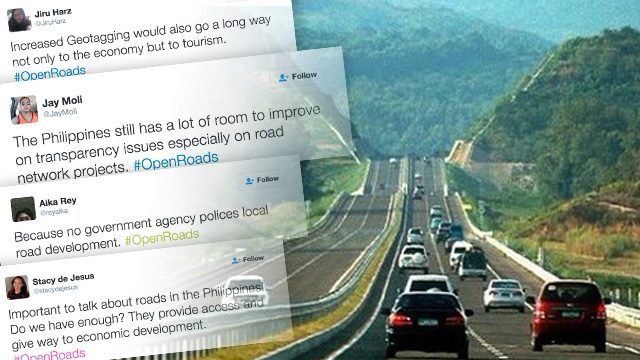SUMMARY
This is AI generated summarization, which may have errors. For context, always refer to the full article.

MANILA, Philippines – Roads are the country’s economic lifeblood. They provide farmers, businessmen, and consumers access to market and pave the way for increased productivity and income.
In the Philippines, the Department of Public Works and Highways (DPWH) is responsible for the creation, improvement, and maintenance of national roads. The local government units (LGUs), on the other hand, are accountable for all the local roads, which make up 85% of the total road network.
This set-up, however, brings to light important questions: Are LGUs capable of carrying out this task? Is it possible to insulate road projects from politics?
Local govt handles 85% of the total road network. Is it being managed well? We need to pay attention! #OpenRoads
Netizens tackled these questions during the online conversation conducted by MovePH, Rappler’s civic engagement arm, on Monday, April 6.
The online discussion was held alongside the #OpenRoads Rappler Talk with Commission on Audit chairperson Michael Aguinaldo, Department of the Interior and Local Governments (DILG) Director for Planning Development Services Rolyn Zambales, and World Bank Senior Economist Kai Kaiser.
Online reach of #OpenRoads
Let’s take a look at the conversation, its leaders, and what netizens are saying about the country’s roads.
To map the extent of the online conversation, we ran Reach, Rappler’s social listening tool. Reach monitors specific keywords to identify the social media influencers, visualize the discussion, and identify participants’ roles in the discussion.
Based on the data, the online discussion reached 104 million impressions, amplified by 60 unique authors. On Twitter, “impressions” means “the times a user is served a Tweet in timeline or search results.” It peaked at 10:25 am, before the Rappler Talk aired online.
On local roads
What transpired in the online conversation?
The absence of a single agency responsible for Philippine roads, Twitter user Jay Moli said, is one of the causes of corruption.
@MovePH @dpwhco This is where corruption starts. Nobody can be held accountable & cooperating agencies will only point fingers 2 each other.
Rappler researcher Aika Rey and Agos community manager Lou Gepuela explained that this gap poses problems especially for local roads management.
Another issue: fiscal autonomy of local govts. How can LGUs build capacity if they continue depending on natl govt? @MovePH @rapplerdotcom
Local Govt Code mandates local devt councils at all LGUs. Govt devt planning isn’t as participatory as it should be. #OpenRoads @MovePH
Politics-free
The path to making sure that projects are insulated from politics, while bumpy, is straightforward, said Aguinaldo, Zambales, and Kaiser.
To help improve the quality of roads in the country, citizens should take charge, they said.

During the Rappler Talk, Aguinaldo emphasized the role citizens play in making sure that public funds for roads are properly used by leaders.
“It is important to have a regime where the leader is not corrupt, and most importantly, is perceived not to be corrupt,” Aguinaldo said.
This is a challenge for Filipinos who will elect about 80,000 new leaders in May.
This was echoed by netizens during the discussion.
"And we need leaders who pay equal attention to local and national roads." Agree to this, I really have issues with roads. #OpenRoads
Your mayor and your governor have a role to play. So choose well. #OpenRoads @rapplerdotcom @MovePH https://t.co/mdUCQ5kfSy
Road projects information boards must specify the expected construction duration of d project & strict monitoring follows after. #OpenRoads
The Philippines still has a lot of room to improve on transparency issues especially on road network projects. #OpenRoads
Good to ask aspiring leaders this: What will you do to improve community roads? #OpenRoads @rapplerdotcom @MovePH https://t.co/8DyXAcS3Qc
Who should take charge
Kaiser emphasized another way for citizens to take charge. According to him, utilizing technology on mapping road projects, or geo-tagging, can help track ghost projects in communities.
Yes doc. & lately im a fan of getting photos of these roads because for the first we see tangible result.#OpenRoads https://t.co/GHpicv5bj0
One initiative for #OpenRoads is to distribute manuals to local units on accounting and monitoring projects
Something as basic and cheap as geotagging of roads is where we are still lagging #OpenRoads
Increased Geotagging would also go a long way not only to the economy but to tourism. #OpenRoads
Road projects have to be mapped. People shld see if they connect somewhere or go nowhere #OpenRoads @rapplerdotcom https://t.co/MrOEzznKlH
Through the OpenRoads portal, the public can check in the Internet which roads are being rehabilitated or upgraded. From start to completion, the status of a road project can be tracked.
The portal contains the uploaded provincial road network maps, as well as other road projects. Soon, videos of the conditions of priority roads will also be uploaded. – Rappler.com
Take charge and join the movement! Tweet photos that matter to you using the hashtag #OpenRoads!
Add a comment
How does this make you feel?
There are no comments yet. Add your comment to start the conversation.